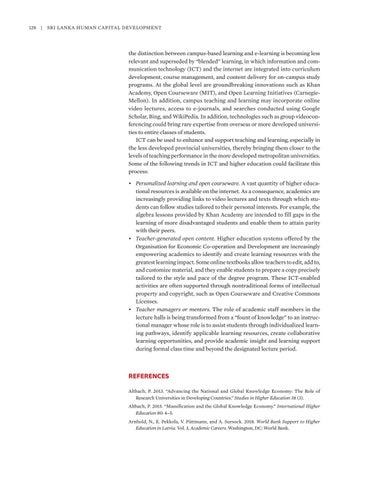128 | Sri Lanka Human Capital Development
the distinction between campus-based learning and e-learning is becoming less relevant and superseded by “blended” learning, in which information and communication technology (ICT) and the internet are integrated into curriculum development, course management, and content delivery for on-campus study programs. At the global level are groundbreaking innovations such as Khan Academy, Open Courseware (MIT), and Open Learning Initiatives (CarnegieMellon). In addition, campus teaching and learning may incorporate online video lectures, access to e-journals, and searches conducted using Google Scholar, Bing, and WikiPedia. In addition, technologies such as group videoconferencing could bring rare expertise from overseas or more developed universities to entire classes of students. ICT can be used to enhance and support teaching and learning, especially in the less developed provincial universities, thereby bringing them closer to the levels of teaching performance in the more developed metropolitan universities. Some of the following trends in ICT and higher education could facilitate this process: • Personalized learning and open courseware. A vast quantity of higher educational resources is available on the internet. As a consequence, academics are increasingly providing links to video lectures and texts through which students can follow studies tailored to their personal interests. For example, the algebra lessons provided by Khan Academy are intended to fill gaps in the learning of more disadvantaged students and enable them to attain parity with their peers. • Teacher-generated open content. Higher education systems offered by the Organisation for Economic Co-operation and Development are increasingly empowering academics to identify and create learning resources with the greatest learning impact. Some online textbooks allow teachers to edit, add to, and customize material, and they enable students to prepare a copy precisely tailored to the style and pace of the degree program. These ICT-enabled activities are often supported through nontraditional forms of intellectual property and copyright, such as Open Courseware and Creative Commons Licenses. • Teacher managers or mentors. The role of academic staff members in the lecture halls is being transformed from a “fount of knowledge” to an instructional manager whose role is to assist students through individualized learning pathways, identify applicable learning resources, create collaborative learning opportunities, and provide academic insight and learning support during formal class time and beyond the designated lecture period.
REFERENCES Altbach, P. 2013. “Advancing the National and Global Knowledge Economy: The Role of Research Universities in Developing Countries.” Studies in Higher Education 38 (3). Altbach, P. 2015. “Massification and the Global Knowledge Economy.” International Higher Education 80: 4–5. Arnhold, N., E. Pekkola, V. Püttmann, and A. Sursock. 2018. World Bank Support to Higher Education in Latvia. Vol. 3, Academic Careers. Washington, DC: World Bank.




